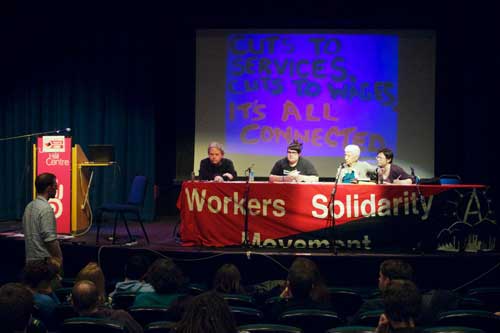Over 30 years of anarchist writing from Ireland listed under hundreds of topics
Work
There's Not Enough Time in the Day
There’s not enough bloody time in the day. I find the more my life goes on, the less time I have to live. I wake up around 6am to go to work, and after my commute home, cooking dinner, and attending to other errands, I have 1 hour to myself if I’m lucky. Often by the time I do these basic tasks it’s late enough that I know I’ll be shattered tomorrow and I’ll have to drag myself through the day. After five days I clamber to the shore of the weekend, but often find I’m so drained and conditioned by the work week I’m not myself. It’s a cycle which has no end in sight. Time is constantly on my mind. ‘Can’t do that, not enough time. Sorry, not enough time. Not enough time. I wish I had more time. Where does the time go?’ Checking my phone, what time is it, checking my phone, checking my phone. It does my head in and it’s not going to improve.
Wealth and the working poor - you'd have to work 703 years to earn what O'Reilly takes
 Roughly over one hundred thousand workers in Ireland are currently working on the minimum wage-thats 9.15 an hour or under 400 euro a week,working 40 hours a week. Around 90% of those on social welfare payment and out of work earn less than they would in work. The old proclamations of our leaders that 'were all middle class now' and the lies spread about those on social welfare are shown to be what they actually are from these facts. They are mere propaganda slogans aimed at convincing us that we live in a more or less equal society and that we should keep quiet about the enormous wealth of corporations and business owners.
Roughly over one hundred thousand workers in Ireland are currently working on the minimum wage-thats 9.15 an hour or under 400 euro a week,working 40 hours a week. Around 90% of those on social welfare payment and out of work earn less than they would in work. The old proclamations of our leaders that 'were all middle class now' and the lies spread about those on social welfare are shown to be what they actually are from these facts. They are mere propaganda slogans aimed at convincing us that we live in a more or less equal society and that we should keep quiet about the enormous wealth of corporations and business owners.
What's the Incentive to Work in an Anarchist Society?
 One of the most common arguments against the establishment of Anarchist Socialism is that there would be no incentive to work in a new, future society - leading to widespread apathy and laziness among the general population, with a few carrying the burden of the overwhelming majority at best and at worst nothing will be done at all. The aim of this piece is to highlight that the opposite is instead true - that in a socialist society there will even more of an incentive to work productively (in the capitalist sense) and to contribute to the communal pot which we can all then draw from.
One of the most common arguments against the establishment of Anarchist Socialism is that there would be no incentive to work in a new, future society - leading to widespread apathy and laziness among the general population, with a few carrying the burden of the overwhelming majority at best and at worst nothing will be done at all. The aim of this piece is to highlight that the opposite is instead true - that in a socialist society there will even more of an incentive to work productively (in the capitalist sense) and to contribute to the communal pot which we can all then draw from.
Firstly we should reject the capitalist ethos of what is productive labour. To summarise under capitalism productive labour is valued by how much profit can be made in a transaction of goods, services or ficticous capital - not by how valuable it is on a human level. Take for instance stock brokers who get enormous pay checks for betting on and moving currency or goods around the world, while mothers and the care givers of children get next to nothing, becoming slaves to charity, the state or their partners (possible all of these) to support them in the rearing and socialisation of children, so arguably one of the most important jobs in society gets no remuneration.
Care & Social Reproduction - Audio or Video of Selma James & Conor McCabe at DABF 2014

The hardship of the current economic crisis has impacted unevenly across genders. This panel from the 2014 Dublin Anarchist Bookfair discussed the intersection of austerity, care-work and women’s reproductive rights. Selma James and Conor McCabe presented with Conor focusing on what this has meant in Ireland in particular.
Bread and Robots: Automation, urban farming and the abolition of wage labour.
“Let us be lazy in everything, except in loving and drinking, except in being lazy.”
- Gotthold Ephraim Lessing

Sex Work as Work - Dr. Laura Agustín at the Dublin anarchist book fair
 Dr. Laura Agustín (author of Sex at the Margins: Migration, Labour Markets and the Rescue Industry) talked at the 2013 Dublin Anarchist Bookfair about why she believes sex work should be treated as work and why we should “resist the general victimising of women who sell sex”.
Dr. Laura Agustín (author of Sex at the Margins: Migration, Labour Markets and the Rescue Industry) talked at the 2013 Dublin Anarchist Bookfair about why she believes sex work should be treated as work and why we should “resist the general victimising of women who sell sex”.
Sex and Sex Work from an Anarcha-Feminist perspective
 In “Sex and Sex Work from and anarcha-feminist perspective”, Leticia looks at the theoretical background to the debate between those who argue for decriminalisation and those who “see sex work (or even sex in general) as violence against women”. She argues that because sex is commodified, sex workers should be treated in the same way as others who engage in exploitative labour.
In “Sex and Sex Work from and anarcha-feminist perspective”, Leticia looks at the theoretical background to the debate between those who argue for decriminalisation and those who “see sex work (or even sex in general) as violence against women”. She argues that because sex is commodified, sex workers should be treated in the same way as others who engage in exploitative labour.
Not Waving but Drowning: Precarity and the Working Class

In ‘Not Waving but Drowning: Precarity and the Working Class’, Mark Hoskins takes a critical look at the idea put forward by some academics and even parts of the anti-capitalist movement that the “precariat” is the revolutionary subject of our epoch. After examining the subjective conditions of the precarious subject today and comparing its objective conditions to those of the working class of the last century, he goes on to explore how these conditions relate to our end goal, a communist society and what lessons that can teach us in our attempt to get there.
Precarity: An Introduction to a Word
 Precarity is a term synonymous with precariousness. It is perhaps best conceived as chronic insecurity. In recent times with the dismantling of the welfare state, the destruction of social security, workers’ existence is becoming more and more insecure. Precarity is a term that has been developed to describe these changes and the new form of working class existence that has developed due to them.
Precarity is a term synonymous with precariousness. It is perhaps best conceived as chronic insecurity. In recent times with the dismantling of the welfare state, the destruction of social security, workers’ existence is becoming more and more insecure. Precarity is a term that has been developed to describe these changes and the new form of working class existence that has developed due to them.
Men are from Earth, and So are Women
 How different are men and women? Very, according to some. John Gray’s book “Men are from Mars, Women are from Venus” is based on the idea that there are fundamental differences between the genders. It may be just another self-help book on relationships, but it has also sold over 30 million copies and been translated into 40 languages. Deborah Tannen’s book “You Just Don’t Understand: Men and Women in Conversation” was on the New York Times bestseller list for nearly four years and has been translated into 24 languages.
How different are men and women? Very, according to some. John Gray’s book “Men are from Mars, Women are from Venus” is based on the idea that there are fundamental differences between the genders. It may be just another self-help book on relationships, but it has also sold over 30 million copies and been translated into 40 languages. Deborah Tannen’s book “You Just Don’t Understand: Men and Women in Conversation” was on the New York Times bestseller list for nearly four years and has been translated into 24 languages.

